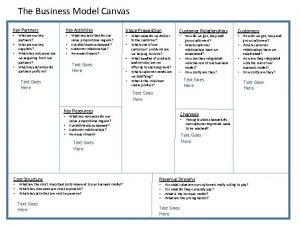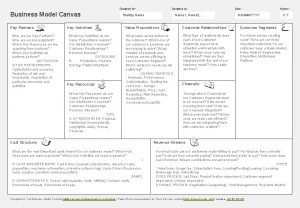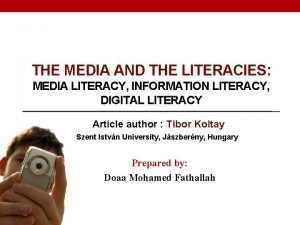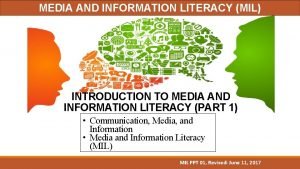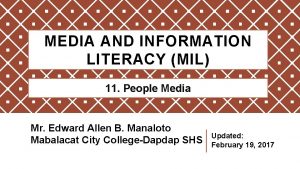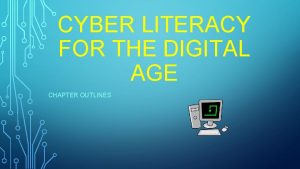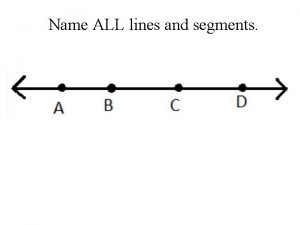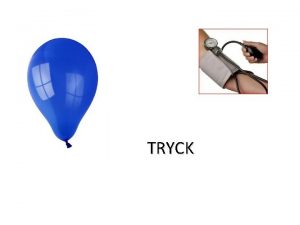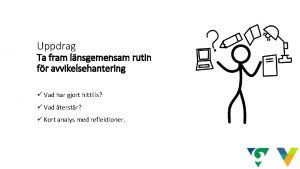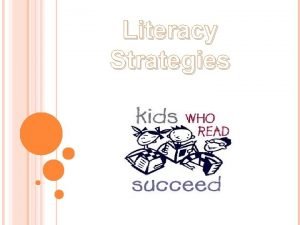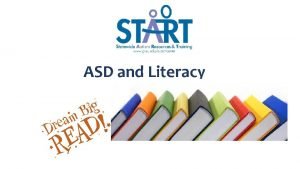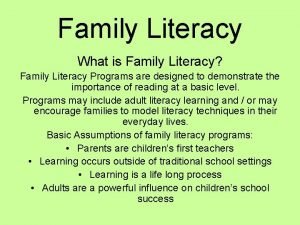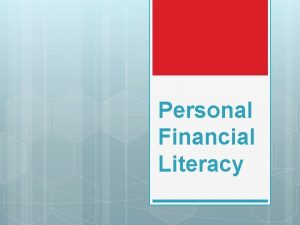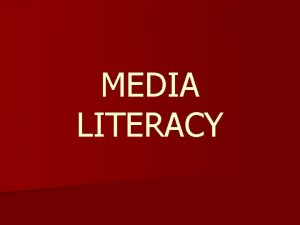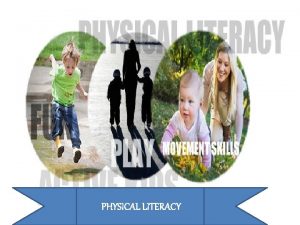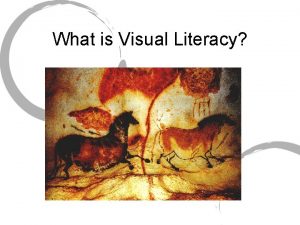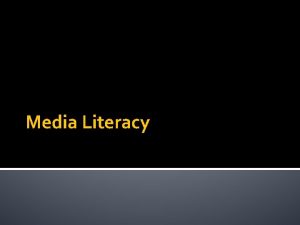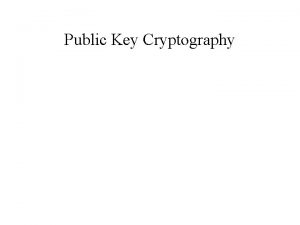All for Literacy Literacy for All Key Literacy





































- Slides: 37

All for Literacy: Literacy for All

Key Literacy Work • CDE Literacy Plan / CDE Literacy Leadership Team • CDE Office of Literacy • School Readiness Assessment • READ Act • Literacy Achievement RFP • ESSU Sponsored Literacy Trainings

CDE Comprehensive Literacy Plan • Draft on CDE website – January 2012 • Drafted with external and internal stakeholders Main components of the Colorado Literacy Plan include: • Literacy goals for CO’s children, birth through 12 th grade • Anchor principles to guide all literacy efforts emanating from the department • Recommendations for meeting Colorado’s literacy goals for all children • Action steps for implementation

State Literacy Plan: 6 System-Wide Essentials 1. Standard-Based Curriculum 2. Instruction and Intervention 3. Comprehensive Assessment 4. Leadership 5. Family and Community Partnerships 6. Educator Preparation and Professional Development

ESSU Reps - Literacy Leadership Team • • • Peg Brown-Clark Tanni Anthony Wendy Leader Jacquelin Medina Cindy Millikin • • Jane Miyahara Candy Myers Gina Quintana Judy Stirman

Role of the CDE Literacy Leadership Team • Implement the CDE Comprehensive Literacy Plan • Collaborate with the Literacy Unit (specific to SWDs) • Implement the READ Act • Ensure cross-unit representation and a unified state voice

CDE Professional Development Opportunities in Planning Stages Colorado literacy project similar to Odyssey (not yet named) – Multiple funding sources – including IDEA funds – Facilitator training Nov. 29, 2012 – 3 local sessions 2 nd semester – Culminating conference April 27 th, 2013 – Topic: “reading like a detective; ” close reading; text complexity; applicable across all grade levels

CDE Professional Development Opportunities in Planning Stages Spring Literacy Leadership Conference – For district/school leaders to become better informed about effective literacy instruction – Include keynote speaker(s) – It may highlight schools with high level of success in literacy

CDE Literacy Office and Staff Teaching and Learning Unit CDE Literacy Office of Literacy - Pati Montgomery – Executive Director - Dian Prestwich – Assistant Director (more staff to be hired) - Dana Hall is the Literacy Specialist (Standards)

Requirements and Attributes of School Readiness Assessment Statutory Authority and Recommendations from the School Readiness Subcommittee

Senate Bill 08 -212 CO’s Achievement Plan for Kids (CAP 4 K) Timeline • 2008: CAP 4 K passes; school readiness and postsecondary workforce readiness defined by SBE • 2009: Standards revision process conducted • 2010: Assessment attributes defined, including those for school readiness • 2011 -2013: Transition process to new standards and assessments • 2013 -14: School readiness plans and assessment to be initiated

Overview of School Readiness within CAP 4 K • Requirements of State Board – Define school readiness and Adopt one or more assessments aligned with definition of school readiness • Requirements of local education providers – Beginning in the fall of 2013, ensure all children in publicly funded preschool (Results Matter) or kindergarten (in process of approving an assessment) receive an Individual School Readiness Plan – Administer the school readiness assessment to each student in kindergarten

What is Meant by “School Readiness”? State Board Adopted Definition: • School Readiness describes both the preparedness of a child to engage in and benefit from learning experiences, and the ability of a school to meet the needs of all students enrolled in publicly funded preschool or kindergarten. • School Readiness is enhanced when schools, families, and community service providers work collaboratively to ensure that every child is ready for higher levels of learning in academic content.

How Can School Readiness Information Be Used? School readiness assessment information WILL be used to: • inform development of an individualized school readiness plan for each child • help direct teachers’ practice within the classroom with each student and thereby maximize each student’s progress toward demonstrating school readiness • report to the Education Committee, at a population aggregate level, an annual summary of the levels of school readiness demonstrated by students enrolled in kindergarten • drive instruction

How Will School Readiness Information NOT Be Used? School readiness assessment information WILL NOT be used to: • deny a student admission or progression to kindergarten or first grade

Timeline for School Readiness Assessment Decision Month Activity July Hold first SR Advisory Committee meeting August –Meet with SR Assessment Subcommittee –Conduct outreach to districts –Hold regional meetings September –SR Assessment Subcommittee reviews SR assessments –Conduct outreach to districts –Hold regional meetings October 2012 –Conduct outreach to districts –Hold regional meetings November 2012 Presentation of SR assessment recommendations to SBE December 2012 SBE votes to adopt SR assessment(s) January – May 2013 Disseminate information to support district implementation

Colorado READ Act HB 12 -1238 Check your handouts on your disk. http: //www. cde. state. co. us/coloradoliteracy/Read. Act/index. asp

The Bottom Line… • With the exception of grades six and seven, little progress has been made in reading achievement in Colorado. • If third grade is the gateway to reading success, Colorado is only adequately preparing 70% of its children for future academic success. • Once children score in the unsatisfactory range, it is unlikely they will emerge. • The literacy achievement of Colorado’s children signals the need for intensive and coordinated efforts in policy and practice.

READ Act Compared with CBLA READ Act Use of interim assessment(s) for all K-3 students from approved list. Follow up with approved diagnostic assessment(s). Individualized Literacy Plan (ILP) for students reading below grade level. READ plan for students with a significant reading deficiency (being defined through rule making process) Provide interventions to accelerate progress and make advancement decision when students do not make determined progress. Support provided through the Read To Achieve grant. Support provided through a competitive Early Literacy Grant, regional technical assistance, and formula funds for interventions. Plus: Specific parental involvement components. Recommended instructional programming and professional development.

Grade Level and Above Universal Instruction Previous ILPs – No longer required as of July 1, 2013 Instruction given at this level is a whole-school, datadriven, prevention-based framework for improving learning outcomes for every student through a layered continuum of evidence-based practices and systems. DRAFT VISUAL Below Grade Level Needs met through schools' RTI process Instruction at this level is based on the use of reading performance data acquired through interim assessments in the regular classroom with a targeted focus on the reading needs of the student through a multi-tiered instructional system. Significant Reading Deficiency READ Plan Instruction based on data gathered through frequent progress monitoring should reflect increased time, duration and intensity -- and be specifically designed for a student's identified reading deficiency. May include SWDs

What Supports are Included in the READ Act? • Regional technical assistance and professional development • Per pupil intervention funds for students identified with significant reading deficiencies to be used for: – – Intervention services Full day kindergarten Summer literacy programs Tutoring services • Early literacy grant program

What are the Assessment Requirements within the READ Act? • Interim assessment(s) from approved list to screen and determine students with significant reading deficiencies • Diagnostic assessment from approved list to determine specific skill deficits for students with significant reading deficiencies • Progress monitoring to determine progress • End of year (Summative) testing to determine if READ goals were met.

Recommended Reading Assessments (Interim, Diagnostic, Summative) • Valid, reliable and proven to effectively and accurately measure skills in the areas of <all 5 components> • Each diagnostic assessment is proven to accurately identify student’s specific reading skill deficiencies • At least one reading assessment for K, 1 st, 2 nd & 3 rd is normed for students who speak Spanish as their native language; and is available in both Spanish and English

What needs to be included in a READ Plan? • Body of Evidence to identify significant reading deficiencies, including specific diagnosed reading skill deficiencies • Goals and benchmarks for the student to attain reading competency. • Type of additional instructional services and interventions that will be provided. • Scientifically or evidence based programming to be used, which at a minimum must address… – Phonemic awareness – Phonics – Vocabulary development – Reading fluency, including oral skills – Reading Comprehension

What Needs to be Included in a READ Plan? • The manner in which the student’s progress will be monitored. • The strategies the student’s parent is encouraged to use in assisting the student to achieve reading competency. • Any additional services, if applicable.

What Needs to be Included in a READ Plan? • If a student has a significant reading deficiency, the student’s READ Plan shall include the intervention instruction that the local education provider provides through the Response to Intervention Framework or a comparable intervention system…

READ Plan & Students with IEPs Integrate, as appropriate, intervention strategies to address the student’s reading deficiency into a student’s Individual Education Plan (IEP) in lieu of a READ Plan if a student is identified as having a disability that impacts progress in developing reading skills.

What are the requirements for implementing a READ Plan? • The teacher and any other school personnel shall create the READ plan in collaboration with the parent, if possible. • The teacher shall continue to revise, at least annually, and implement a student’s READ plan until the student attains reading competency, regardless of grade level and regardless of where the READ plan was originally created.

More requirements for implementing a READ Plan: • If a student has a READ plan for 2 years or more: – The teacher shall revise the plan to include additional, more rigorous instructional strategies and interventions. – The principal shall ensure the student receives reading instruction in conjunction with and supported through other subjects throughout the day. – If possible, the student shall receive reading instruction from a teacher who is identified as effective or highly effective in his/her most recent performance evaluation and has expertise in teaching reading. • The teacher shall include all versions of the READ plan and any supporting documents for the plan and body of evidence in the student’s permanent academic record.

What are the requirements for parent communication within the READ Act? • Meet with the parent to communicate orally and in writing information related to the importance of attaining reading competency. • Meet with the parent to jointly create the READ plan and provide a written copy of the READ plan. • Provide ongoing regular updates concerning the results of the intervention instruction described in the READ plan and the student’s progress in attaining reading competency.

What are the considerations for advancement of students with significant reading deficiencies? • In 2013 -2014, for students in grades K-3 completing the school year with a significant reading deficiency, the parent and school personnel shall decide whether the student will advance to the next grade level. The parent makes the final decision if there is a disagreement. • In 2016 -2017, for a student completing third grade with a significant reading deficiency, the parent and school personnel shall decide whether the student will advance to fourth grade. The. Superintendent/ designee makes the final decision regarding advancement

Exceptions to “Advancement Decision” Requirements • Student with a disability who is eligible to take the statewide alternative assessment OR student is identified as having a disability that substantially impacts the student’s progress in developing reading skills • Student with limited English proficiency & significant reading deficiency is due primarily to English language skills • Student is completing 2 nd year at same grade level

What about a student whose reading skills are below grade level but not “significantly deficient? ” The local education provider shall ensure that the student receives appropriate interventions through the Response to Intervention framework or comparable intervention system implemented by the local education provider.

State Board Action Calendar Rules Related to the Early Literacy Grant Rules Related to the READ Act Resource Bank and Data Collection August 8, 2012 Notice of rulemaking hearing November 7 or 8, 2012 Notice of rulemaking hearing October 3 or 4, 2012 Rulemaking hearing January 2013 First rulemaking hearing November 7 or 8, 2012 Adoption of rules February 2013 Second rulemaking hearing March 2013 Adoption of rules

READ Act Rule Outline Available on READ Act webpage: http: //www. cde. state. co. us/coloradoliteracy/R ead. Act/index. asp

Increasing Achievement and Growth Grant Now Available • The goal of this grant is to improve educational outcomes and academic results, and close academic achievement gaps for Colorado students with disabilities. A total of $4. 5 million is available to administrative units over the three and-a-half year grant period. Proposals are due Friday, Nov. 16. For more information and to access the RFP, please visit http: //www. cde. state. co. us/cdesped/dircorner. asp

ESSU Professional Development Opportunities Related to Literacy • 5 regional sessions “SLD Reading: A Deeper Dive into Phonology and Advanced Decoding” with Melody Ilk (September 25 through November 8) • Ongoing SLP Training – concepts based standards • Creating and Instructing Tactile Graphics – October 5 -6, 2012 • Literacy Instruction for Students with Significant Support Needs with the Center on Literacy and Disability Studies – Summer Institutes 2011, 2012, and 2013
 Which key resources are we acquiring from partners
Which key resources are we acquiring from partners Key partners
Key partners Similarities of media literacy and technology literacy
Similarities of media literacy and technology literacy 3 basic components of media and information literacy
3 basic components of media and information literacy Shs teacher people as media or people in media
Shs teacher people as media or people in media Cyber literacy and digital literacy
Cyber literacy and digital literacy Name all the lines name all the segments name all the rays
Name all the lines name all the segments name all the rays Formuö
Formuö Typiska novell drag
Typiska novell drag Tack för att ni lyssnade bild
Tack för att ni lyssnade bild Ekologiskt fotavtryck
Ekologiskt fotavtryck Varför kallas perioden 1918-1939 för mellankrigstiden
Varför kallas perioden 1918-1939 för mellankrigstiden En lathund för arbete med kontinuitetshantering
En lathund för arbete med kontinuitetshantering Underlag för särskild löneskatt på pensionskostnader
Underlag för särskild löneskatt på pensionskostnader Vilotidsbok
Vilotidsbok Anatomi organ reproduksi
Anatomi organ reproduksi Densitet vatten
Densitet vatten Datorkunskap för nybörjare
Datorkunskap för nybörjare Boverket ka
Boverket ka Debattartikel struktur
Debattartikel struktur För och nackdelar med firo
För och nackdelar med firo Nyckelkompetenser för livslångt lärande
Nyckelkompetenser för livslångt lärande Påbyggnader för flakfordon
Påbyggnader för flakfordon Kraft per area
Kraft per area Svenskt ramverk för digital samverkan
Svenskt ramverk för digital samverkan Jag har gått inunder stjärnor text
Jag har gått inunder stjärnor text Presentera för publik crossboss
Presentera för publik crossboss Jiddisch
Jiddisch Kanaans land
Kanaans land Treserva lathund
Treserva lathund Epiteltyper
Epiteltyper Claes martinsson
Claes martinsson Centrum för kunskap och säkerhet
Centrum för kunskap och säkerhet Byggprocessen steg för steg
Byggprocessen steg för steg Mat för idrottare
Mat för idrottare Verktyg för automatisering av utbetalningar
Verktyg för automatisering av utbetalningar Rutin för avvikelsehantering
Rutin för avvikelsehantering Smärtskolan kunskap för livet
Smärtskolan kunskap för livet
